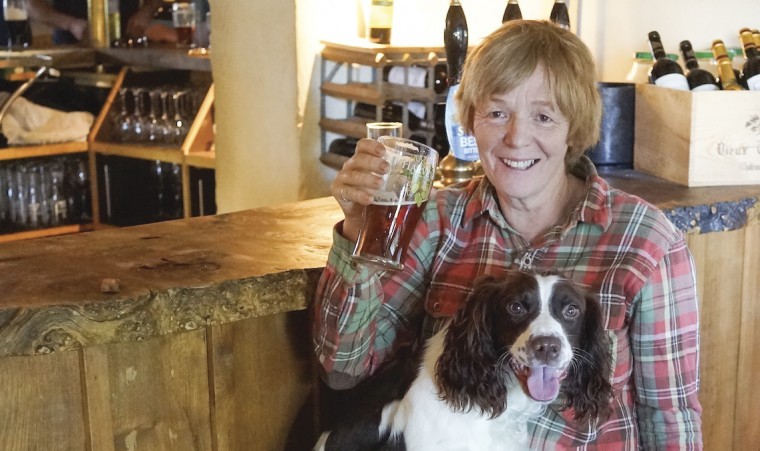The warmth of the kitchen stove is comforting when you come in from the wet. Our kitchen is a haven for damp dogs, cold humans and wet clothes. The stove is busy cooking up stews and cakes. My other half is a firm believer in keeping the ‘inner man fed’. The beauty of stews is that you can start them off early in the day, chuck them in the bottom oven and forget them. Later when we both come home tired and hungry it’s so good to have a delicious hot meal waiting to be consumed.
The stock yards continuously require bedding down with straw and feeders replenishing with hay and silage. What makes it worthwhile is seeing cattle munching contentedly or laying down chewing their cud. Right now they have a better deal than the sheep, who are treading in much of their grass, due to the soggy conditions. A conversation about grazing licenses with the Sussex Wildlife Trust, revealed their delight in the wet weather which is perfect for the wading birds. This follows two comparatively dry autumns, so although not overjoyed myself, it’s good this weather brings some benefits. I’m sure drought ridden Australia and California would be glad of our rainfall, fires on that scale must be pretty scary.
We’re calving another batch of cows. In October when we got them home from the marsh, I was concerned about one young Hereford x Simmental. Eight days later she had twins, born in the early hours. One calf was cold and required reviving. No suck reflex, and our usual colostrum store depleted. A quick shopping trip was necessary. Meanwhile the calf received a vigorous rubbing down, followed by a short time under an old horse rug. On arrival of the magic powder, it was mixed and tubed into the calf. We moved this family unit into the VIP cattle suite and then rushed off, late for our day’s beating duties. On our return the calf was ready to be helped to his feet and learn how to compete with his sibling from the milk bar. All well now, it’s a reminder to keep a better track on resources.
Today our tups trotted into the field to meet their ladies with the words of advice ‘make love, not war’ and ‘stay out of water’ ringing in their ears. Nothing more annoying than when they waste their energy on scrapping, as they can inflict serious damage to each other. I’m hoping they learn to go around the water courses and not try to cross them. Floating sheep are good for nothing. Fingers crossed, they heed my advice. They certainly executed the first two words, in no time at all, time will tell on the latter.
Incidentally a slightly worrying map popped up on my Facebook feed today with a new climate forecast showing land that will be below sea level in 2050. Much of the coastline and inlets will be under water, including some of our grazing land. I’m inclined not to panic about anything posted on social media. But if agriculture can be useful in mitigating the affects of global warming, I applaud farming in a more sustainable way. I attended a conference entitled ‘High Weald Farming Futures, building soils, resilience and profit.’ Regenerative farming has some interesting suggestions which could help to create solutions.
The present fad of anti meat media coverage is damaging for livestock farmers, reflected in the reduced prices we’re receiving. It reminds me of the BSE debacle, when experts declared huge numbers of people would die of vCJD. Thankfully they were wrong, but it took the beef industry years to recover trade. ‘New science by a global team of IPCC researchers based at Oxford University, shows categorically that methane from Britain’s ruminants is not causing global warming – instead ruminants provide a viable pathway to net zero emissions from UK agriculture by 2030.’ It’s a sad reflection of today’s world that these positive stories are neglected.
‘Uncertainty to Opportunity’ was the title for this year’s South of England Conference. Where among other things the challenges of attracting the younger generation into our industry was discussed. Although not touched on, making the older generation hand over the reigns can be tricky. It stands to reason that if you’ve worked a farm all your life, you form an attachment with it and hence the reluctance to walk away. Personally I wish that planning policies would look more favourably on allowing farming enterprises to have two dwellings on site. One for the younger generation to harness their energy and enthusiasm, and one for the older generation so that their steadying influence, wisdom and life skill knowledge can be tapped into!
Farming is not easy to break into. It was compared to the construction industry where apparently £200 is the going day rate. In reality not many farming businesses can afford paying this, unless they’ve recently sold land for building, or have other income streams. These days, rural living, love of the land and animals, plays a big part in why we continue farming. We certainly don’t do it for the money. But we do need an income to survive, I hope that one day food producers will receive the respect they deserve.
Talking construction, my daughter, Hazel and her husband, Martin’s cheese dairy is complete. So making cheese has started in earnest, they are perfecting their recipe. They are appreciating the better facilities, and my cheese turning abilities are improving. We have to wait, whilst maturation takes place. Good things are worth waiting for!
Farm Women’s group had a talk about ‘Birds of Prey’ I discovered I’ve something in common with Barn Owls. Neither of us like getting wet!
Wishing all the very best for Christmas, if you can’t be good, be careful!




